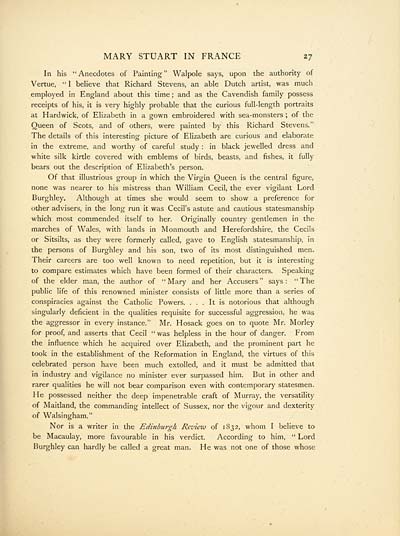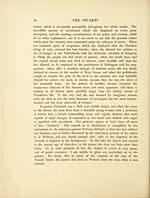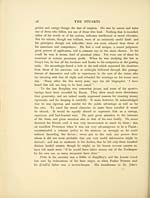Stuarts
(51) Page 27
Download files
Complete book:
Individual page:
Thumbnail gallery: Grid view | List view

MARY STUART IN FRANCE 27
In his "Anecdotes of Painting" Walpole says, upon the authority of
Vertue, " I believe that Richard Stevens, an able Dutch artist, was much
employed in England about this time ; and as the Cavendish family possess
receipts of his, it is very highly probable that the curious full-length portraits
at Hardwick, of Elizabeth in a gown embroidered with sea-monsters ; of the
Queen of Scots, and of others, were painted by this Richard Stevens."
The details of this interesting picture of Elizabeth are curious and elaborate
in the extreme, and worthy of careful study : in black jewelled dress and
white silk kirtle covered with emblems of birds, beasts, and fishes, it fully
bears out the description of Elizabeth's person.
Of that illustrious group in which the Virgin Queen is the central figure,
none was nearer to his mistress than William Cecil, the ever vigilant Lord
Burghley. Although at times she would seem to show a preference for
other advisers, in the long run it was Cecil's astute and cautious statesmanship
which most commended itself to her. Originally country gentlemen in the
marches of Wales, with lands in Monmouth and Herefordshire, the Cecils
or Sitsilts, as they were formerly called, gave to English statesmanship, in
the persons of Burghley and his son, two of its most distinguished men.
Their careers are too well known to need repetition, but it is interesting
to compare estimates which have been formed of their characters. Speaking
of the elder man, the author of "Mary and her Accusers" says: "The
public life of this renowned minister consists of little more than a series of
conspiracies against the Catholic Powers. . . . It is notorious that although
singularly deficient in the qualities requisite for successful aggression, he was
the aggressor in every instance." Mr. Hosack goes on to quote Mr. Morley
for proof, and asserts that Cecil "was helpless in the hour of danger. From
the influence which he acquired over Elizabeth, and the prominent part he
took in the establishment of the Reformation in England, the virtues of this
celebrated person have been much extolled, and it must be admitted that
in industry and vigilance no minister ever surpassed him. But in other and
rarer qualities he will not bear comparison even with contemporary statesmen.
He possessed neither the deep impenetrable craft of Murray, the versatility
of Maitland, the commanding intellect of Sussex, nor the vigour and dexterity
of Walsingham."
Nor is a writer in the Edinburgh Revieiv of 1832, whom I believe to
be Macaulay, more favourable in his verdict. According to him, " Lord
Burghley can hardly be called a great man. He was not one of those whose
In his "Anecdotes of Painting" Walpole says, upon the authority of
Vertue, " I believe that Richard Stevens, an able Dutch artist, was much
employed in England about this time ; and as the Cavendish family possess
receipts of his, it is very highly probable that the curious full-length portraits
at Hardwick, of Elizabeth in a gown embroidered with sea-monsters ; of the
Queen of Scots, and of others, were painted by this Richard Stevens."
The details of this interesting picture of Elizabeth are curious and elaborate
in the extreme, and worthy of careful study : in black jewelled dress and
white silk kirtle covered with emblems of birds, beasts, and fishes, it fully
bears out the description of Elizabeth's person.
Of that illustrious group in which the Virgin Queen is the central figure,
none was nearer to his mistress than William Cecil, the ever vigilant Lord
Burghley. Although at times she would seem to show a preference for
other advisers, in the long run it was Cecil's astute and cautious statesmanship
which most commended itself to her. Originally country gentlemen in the
marches of Wales, with lands in Monmouth and Herefordshire, the Cecils
or Sitsilts, as they were formerly called, gave to English statesmanship, in
the persons of Burghley and his son, two of its most distinguished men.
Their careers are too well known to need repetition, but it is interesting
to compare estimates which have been formed of their characters. Speaking
of the elder man, the author of "Mary and her Accusers" says: "The
public life of this renowned minister consists of little more than a series of
conspiracies against the Catholic Powers. . . . It is notorious that although
singularly deficient in the qualities requisite for successful aggression, he was
the aggressor in every instance." Mr. Hosack goes on to quote Mr. Morley
for proof, and asserts that Cecil "was helpless in the hour of danger. From
the influence which he acquired over Elizabeth, and the prominent part he
took in the establishment of the Reformation in England, the virtues of this
celebrated person have been much extolled, and it must be admitted that
in industry and vigilance no minister ever surpassed him. But in other and
rarer qualities he will not bear comparison even with contemporary statesmen.
He possessed neither the deep impenetrable craft of Murray, the versatility
of Maitland, the commanding intellect of Sussex, nor the vigour and dexterity
of Walsingham."
Nor is a writer in the Edinburgh Revieiv of 1832, whom I believe to
be Macaulay, more favourable in his verdict. According to him, " Lord
Burghley can hardly be called a great man. He was not one of those whose
Set display mode to:
![]() Universal Viewer |
Universal Viewer | ![]() Mirador |
Large image | Transcription
Mirador |
Large image | Transcription
Images and transcriptions on this page, including medium image downloads, may be used under the Creative Commons Attribution 4.0 International Licence unless otherwise stated. ![]()
| Histories of Scottish families > Stuarts > (51) Page 27 |
|---|
| Permanent URL | https://digital.nls.uk/95239663 |
|---|
| Description | A selection of almost 400 printed items relating to the history of Scottish families, mostly dating from the 19th and early 20th centuries. Includes memoirs, genealogies and clan histories, with a few produced by emigrant families. The earliest family history goes back to AD 916. |
|---|

